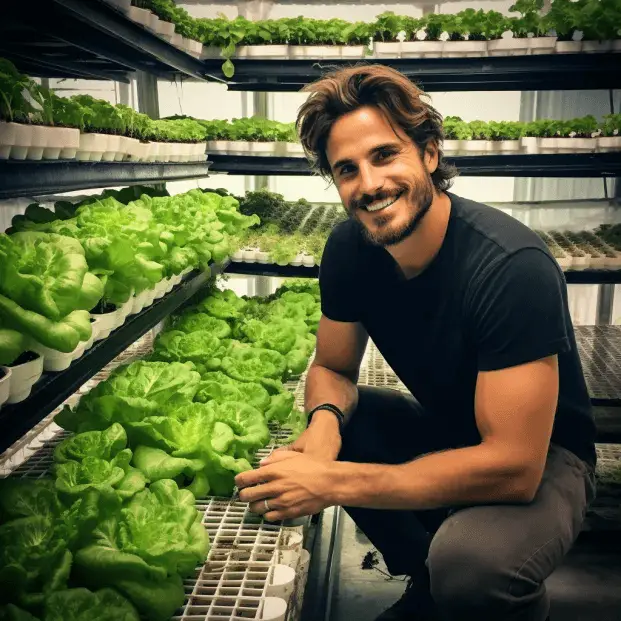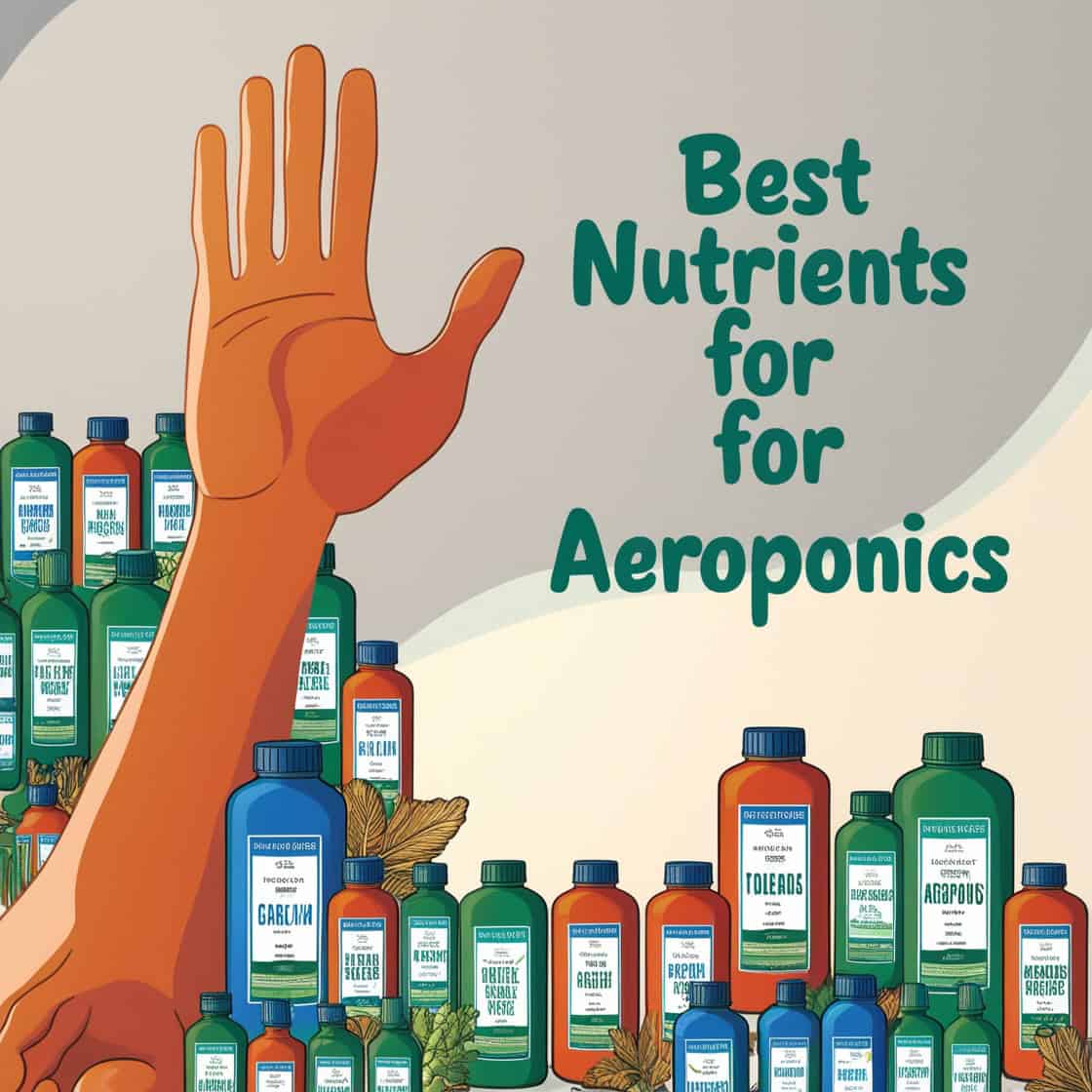Key Takeaways
1. Macronutrients like nitrogen, phosphorus, and potassium are essential for plant growth.
2. Regular monitoring of nutrient levels and pH is crucial for optimal health.
3. Brands like Advanced Nutrients and Dutch Master Gold are highly recommended for aeroponic systems.
Aeroponics is a fascinating method of growing plants without soil. Instead, it uses a nutrient-rich mist to deliver essential nutrients directly to the roots. Choosing the right nutrients is crucial for ensuring healthy plants and maximizing yields. In this article, we’ll explore the best nutrients for aeroponics, how to select the right nutrient solutions, and best practices for managing them. Keep reading to learn how to create a thriving aeroponic garden!
Source: Mike Axelrod Adventures
Overview of Nutrients for Aeroponics
Aeroponics relies on a fine mist of nutrient solutions to promote plant growth (1). This method allows for efficient nutrient delivery directly to the roots, which is vital for maximizing yields. The right nutrients can make a significant difference in how well your plants grow.
Key Nutrients for Aeroponics
Macronutrients
These nutrients are needed in larger quantities and are essential for plant health. Here are the main macronutrients:
- Nitrogen (N): This nutrient is crucial for leaf growth and overall plant vigor. Without enough nitrogen, plants may become stunted and yellow. Nitrogen plays a major role in the synthesis of amino acids, which are the building blocks of proteins necessary for plant development.
- Phosphorus (P): Important for root development and flowering, phosphorus helps plants establish a strong foundation and produce blooms. It is also involved in energy transfer within the plant, making it vital for overall health.
- Potassium (K): This nutrient aids in water regulation and overall plant health. It helps plants withstand stress and improves fruit quality. Potassium also plays a role in enzyme activation, which is essential for various metabolic processes.
Micronutrients
While needed in smaller amounts, micronutrients are equally important for plant functions:
- Iron (Fe): Vital for chlorophyll production, iron helps plants maintain their green color and perform photosynthesis efficiently. A deficiency in iron can lead to yellowing leaves, particularly in younger foliage.
- Calcium (Ca): Important for cell wall structure and growth, calcium supports overall plant strength. It also plays a role in nutrient uptake and enzyme activity, making it essential for healthy growth.
- Magnesium (Mg): Central to chlorophyll and enzyme function, magnesium plays a key role in photosynthesis. It helps plants convert sunlight into energy and is crucial for the production of sugars.
Choosing the Right Nutrient Solution
When selecting a nutrient solution for aeroponics, several factors come into play:
Formulation
It’s best to use a two-part nutrient solution rather than a one-part solution. This helps prevent clogging in misting systems, which can be a common issue. Many growers recommend avoiding organic nutrients due to their potential to clog systems. A two-part solution allows for better control over nutrient ratios.
Concentration and pH
Maintaining the right concentration, measured in parts per million (PPM), and pH level is crucial for nutrient absorption. The ideal pH range for aeroponics is typically between 5.5 and 6.5. Regularly testing and adjusting pH levels can prevent nutrient lockout, where plants are unable to absorb necessary nutrients.
Compatibility with Systems
Some nutrients are specifically designed for aeroponic systems and are less likely to cause clogging. Brands like Advanced Nutrients and Dutch Master Gold are often recommended for their effectiveness in aeroponic setups. These brands have formulations that cater specifically to the needs of plants grown in misting environments.
Best Practices for Nutrient Management
To achieve maximum yields in your aeroponic garden, follow these best practices for nutrient management:
Regular Monitoring
Regularly check the nutrient solution’s PPM and pH to ensure optimal conditions for plant growth (2). This helps you catch any issues before they become serious problems. Use reliable testing kits to measure these levels accurately.
Adjusting Nutrient Levels
As plants grow, their nutrient needs will change. Be prepared to adjust the nutrient solution accordingly to meet these changing requirements. For instance, young plants may require higher nitrogen levels for leafy growth, while flowering plants will need more phosphorus.
Cleanliness
Keep the aeroponic system clean to prevent algae growth and nutrient buildup, which can affect plant health. A clean system promotes better nutrient absorption and overall plant vigor. Regularly flush the system with clean water to remove any residue.
Water Quality
The quality of water used in aeroponics is vital, as it affects nutrient absorption and overall plant health. Using filtered or distilled water can help prevent contaminants from interfering with nutrient uptake. Remember, “water is not just water.”
Temperature and Humidity Control
Maintaining the right temperature and humidity levels in your growing environment is essential for nutrient uptake. Most plants thrive in temperatures between 65°F to 75°F (18°C to 24°C) and humidity levels around 50% to 70%. Monitoring these factors can enhance nutrient absorption and plant health.
FAQ
Can I use tap water for my aeroponic system?
While tap water can be used, it often contains chlorine, chloramine, and other minerals that can affect nutrient absorption. It’s advisable to use filtered or distilled water to ensure optimal plant health.
How often should I change the nutrient solution in my aeroponic system?
It’s generally recommended to change the nutrient solution every two weeks. However, this can vary depending on plant growth stages and nutrient uptake. Regular monitoring will help determine the best schedule.
What are the signs of nutrient deficiency in aeroponic plants?
Common signs include yellowing leaves (nitrogen deficiency), stunted growth (phosphorus deficiency), and browning leaf edges (potassium deficiency). Identifying these signs early can help you adjust nutrient levels promptly.
Can I use hydroponic nutrients in my aeroponic system?
Yes, hydroponic nutrients can be used in aeroponics, but ensure they are suitable for misting systems. Look for formulations that are specifically designed for aeroponic applications to avoid clogging.
Are there any organic nutrient options for aeroponics?
While organic nutrients are available, they may not be the best choice for aeroponics due to the risk of clogging. If you prefer organic options, look for liquid organic fertilizers that are specifically formulated for hydroponic or aeroponic systems.
How do temperature fluctuations affect nutrient uptake in aeroponics?
Temperature fluctuations can stress plants and affect nutrient absorption. Ideally, maintain a stable temperature between 65°F to 75°F (18°C to 24°C) to ensure optimal nutrient uptake and overall plant health.
What role does oxygen play in nutrient absorption in aeroponics?
Oxygen is crucial for root health in aeroponics. Healthy roots need oxygen to absorb nutrients effectively. Ensure that the misting system provides adequate oxygenation to the roots for optimal nutrient uptake.
Can I mix different brands of nutrients in my aeroponic system?
Mixing different brands is generally not recommended unless you are sure they are compatible. Different formulations may have varying concentrations and pH levels, which can lead to nutrient lockout or imbalance.
What impact does light intensity have on nutrient absorption in aeroponics?
Light intensity can significantly affect photosynthesis and, consequently, nutrient uptake. Higher light levels can increase a plant’s nutrient needs, so adjustments to the nutrient solution may be necessary during periods of intense light.
How do different growth stages affect nutrient requirements in aeroponics?
Nutrient needs vary by growth stage. For example, seedlings require higher nitrogen for leafy growth, while flowering plants need more phosphorus and potassium. Tailoring nutrient solutions to these stages can enhance growth and yield.
Conclusion
In conclusion, understanding the best nutrients for aeroponics is essential for maximizing plant health and yield. By focusing on key macronutrients and micronutrients, choosing the right nutrient solutions, and following best practices for management, growers can create a thriving aeroponic garden. With careful attention to detail, anyone can enjoy the benefits of this innovative growing method. Happy gardening!
By implementing these strategies and being mindful of nutrient management, growers can ensure their aeroponic systems flourish, leading to bountiful harvests and healthy plants. Whether you’re a beginner or an experienced grower, mastering the art of nutrient selection and management will set the foundation for successful aeroponic gardening.
Related Articles
- https://tophydroponicgarden.com/hydroponic-nutrient-guide/
- https://tophydroponicgarden.com/aeroponics/
- https://tophydroponicgarden.com/best-hydroponic-plant-nutrients/
References
- https://www.sciencedirect.com/topics/agricultural-and-biological-sciences/aeroponics
- https://www.grovida.us/how-to-hydroponics/maintaining-nutrient-concentration-and-ph.html
Was this helpful?

I’m Barrie L., a passionate hydroponic gardening enthusiast dedicated to cultivating thriving, soil-less gardens. With a focus on all things hydroponic, I share my expertise on innovative growing techniques and sustainable practices through my blog, tophydroponicgarden.com. As a seasoned hydroponics specialist, my goal is to inspire and guide fellow gardeners in harnessing the power of water-based cultivation for bountiful and eco-friendly harvests. I’m also an author of the book “Hydroponics For Absolute Beginners: Your Step By Step Guide For How To Create An Hydroponics System At Home Without Soil, For Growing Vegetable, Fruit And Herbs.” which is sold on Amazon. Join me on a journey of redefining the way we cultivate plants, one nutrient-rich solution at a time. Happy growing!


